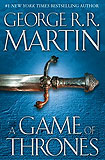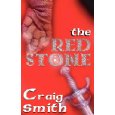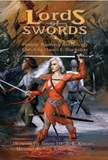
A Game of Thrones, by George R. R. Martin
Book Review by David L. Felts
Have you read this book?
If you haven't caught HBO's series Game of Thrones, I highly recommend
it. On the heels of enjoying the series, I decided to do a re-read of
the novels. Game of Thrones was first published in 1996. I think I might
have read it that year, or shortly thereafter. Now a review of a novel
published over 15 years ago might not be timely, but the re-surging
interest due to the series makes it relevant.
The first book in A Song of Ice and Fire, Game of Thrones introduces us to Martin's imaginary world and its main characters, as well as kicking off some plot lines that form the basis of future novels. What's interesting about the novel is the way Martin chooses to tell the story. Each chapter is dedicated to the viewpoint of one character. As a result, we get to know them intimately. So not only do we get to see the characters the way they see themselves, we also get to see them the way other characters see them.
Martin uses this technique very effectively. A character who might be seen as unfavorable by others can turn out to be far more complex and sympathetic once we get into his or her head. As an example, Tyrion Lannister is seen by many as a disfigured and venal dwarf, but when exposed to his point of view, we begin to understand him and the choices he makes. This complexity adds a great deal of verisimilitude to the story.
The downfall of this technique is that it can be confusing to keep the characters and their motivations straight and that it limits our view of events. While not so much an issue in the first book, which bounces back and forth between the viewpoints of eight main characters, later books in the series use as many as fourteen. It can also tend to mire the story in minutia; some of things the characters deal with don't seem to have much relevance to the overall big story. Such a tightly focused perspective can inhibit our ability to see the big picture.
Another interesting thing Martin does is kill people off. Since there is no one viewpoint that the story hinges on, all the characters are disposable. At first, it's surprising when a viewpoint character is killed, and somewhat exciting too, once we realize that anyone at any time could bite it. It certainly adds a lot of uncertainty to the story. A good thing, in my opinion.
Most of this first book centers around Ned Stark and his family, although there is an ancillary storyline about the last two remaining descendants of the family that ruled Westeros before Ned's friend Robert Baratheon rebelled and took over. Ned Stark is a descendant of one of the oldest families in the kingdom, and ruler of the north. His inability to see the world as anything other than black and white causes a lot of problems, both for him, his family and the kingdom. At first, I kind of admired him and his determination to do what he thought was the "right thing", but it didn't take long before I realized it was a weakness, not a strength. Kudos to Martin for pulling off reversals like this; he does it more than once.
My favorite characters where Jon (the bastard son of Ned) and Arya (Ned's youngest daughter). I detested Sansa (Ned's oldest daughter). It's a testament to Martin's skill that his characters can evoke such strong reactions.
Outside Ned's family, we've got Tyrion Lannister and Daenerys Targaryen. Tyrion is the dwarf brother to Cersi (the Queen) and Jamie (the captain of the king's guard). Tyrion's caustic wit, devious intelligence, and self-deprecation make him a great character. I like that I couldn't quite figure him out. Just when you think he's in it for himself, he does something that changes your mind.
Daenerys is the last descendant of the deposed line of kings that used to rule Westeros. She's on her way to becoming a powerful force who might be capable of reclaiming what once was hers.
This is a long book, with a big world, and many characters. Martin doesn't pull and punches; there's violence and sex aplenty, and not glossed over a la Lord of the Rings style. He gets into the nitty-gritty, and that means this isn't a book to give your twelve year-old. If it were a movie, it would be rated R.
Despite the medieval settings, most of Martin's characters have very modern sensibilities. This can be jarring at first, but in the end enables us to more easily identify with the characters and their motivations. There's no attempt to mimic Tolkien's flowery prose or evoke any other sort of old world feel. Not a problem for me, but some fantasy readers might not appreciate it.
Big fantasy tomes (and this is a big one) can represent a large investment of time. Game of Thrones is worth it.
The first book in A Song of Ice and Fire, Game of Thrones introduces us to Martin's imaginary world and its main characters, as well as kicking off some plot lines that form the basis of future novels. What's interesting about the novel is the way Martin chooses to tell the story. Each chapter is dedicated to the viewpoint of one character. As a result, we get to know them intimately. So not only do we get to see the characters the way they see themselves, we also get to see them the way other characters see them.
Martin uses this technique very effectively. A character who might be seen as unfavorable by others can turn out to be far more complex and sympathetic once we get into his or her head. As an example, Tyrion Lannister is seen by many as a disfigured and venal dwarf, but when exposed to his point of view, we begin to understand him and the choices he makes. This complexity adds a great deal of verisimilitude to the story.
The downfall of this technique is that it can be confusing to keep the characters and their motivations straight and that it limits our view of events. While not so much an issue in the first book, which bounces back and forth between the viewpoints of eight main characters, later books in the series use as many as fourteen. It can also tend to mire the story in minutia; some of things the characters deal with don't seem to have much relevance to the overall big story. Such a tightly focused perspective can inhibit our ability to see the big picture.
Another interesting thing Martin does is kill people off. Since there is no one viewpoint that the story hinges on, all the characters are disposable. At first, it's surprising when a viewpoint character is killed, and somewhat exciting too, once we realize that anyone at any time could bite it. It certainly adds a lot of uncertainty to the story. A good thing, in my opinion.
Most of this first book centers around Ned Stark and his family, although there is an ancillary storyline about the last two remaining descendants of the family that ruled Westeros before Ned's friend Robert Baratheon rebelled and took over. Ned Stark is a descendant of one of the oldest families in the kingdom, and ruler of the north. His inability to see the world as anything other than black and white causes a lot of problems, both for him, his family and the kingdom. At first, I kind of admired him and his determination to do what he thought was the "right thing", but it didn't take long before I realized it was a weakness, not a strength. Kudos to Martin for pulling off reversals like this; he does it more than once.
My favorite characters where Jon (the bastard son of Ned) and Arya (Ned's youngest daughter). I detested Sansa (Ned's oldest daughter). It's a testament to Martin's skill that his characters can evoke such strong reactions.
Outside Ned's family, we've got Tyrion Lannister and Daenerys Targaryen. Tyrion is the dwarf brother to Cersi (the Queen) and Jamie (the captain of the king's guard). Tyrion's caustic wit, devious intelligence, and self-deprecation make him a great character. I like that I couldn't quite figure him out. Just when you think he's in it for himself, he does something that changes your mind.
Daenerys is the last descendant of the deposed line of kings that used to rule Westeros. She's on her way to becoming a powerful force who might be capable of reclaiming what once was hers.
This is a long book, with a big world, and many characters. Martin doesn't pull and punches; there's violence and sex aplenty, and not glossed over a la Lord of the Rings style. He gets into the nitty-gritty, and that means this isn't a book to give your twelve year-old. If it were a movie, it would be rated R.
Despite the medieval settings, most of Martin's characters have very modern sensibilities. This can be jarring at first, but in the end enables us to more easily identify with the characters and their motivations. There's no attempt to mimic Tolkien's flowery prose or evoke any other sort of old world feel. Not a problem for me, but some fantasy readers might not appreciate it.
Big fantasy tomes (and this is a big one) can represent a large investment of time. Game of Thrones is worth it.
|
Click here to buy A Game of Thrones, by George R. R. Martin on Amazon
|
A Game of Thrones, by George R. R. Martin on Amazon

| More Books You Might Like |
Comment on A Game of Thrones, by George R. R. Martin



